|
Do you remember ignoring your parents’ announcement of "Lights out!" by continuing to read that new novel? And do you remember the next “reminder,” after you simply tried to get in a couple of paragraphs more? They finally turned out your light, but you were so desperate to know whether Darcy would ever return, or whether Gandalf, Sydney Carton, or Mitch McDeere would survive, that you reached under your bed and pulled out a flashlight. The plot you were so caught up in revolved around some kind of conflict that demanded resolution.
In a similar way, composers elicit responses from you, when, by skillfully using harmony and melody, they narrate a musical story of conflict and resolution, tension and release. The following is a brief attempt to describe some important ways Handel accomplishes this in Messiah.
1 Comment
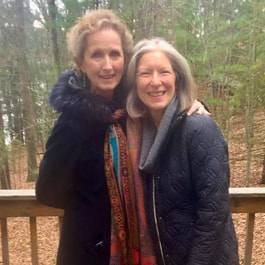 Who is Silvia? What is she, That all our swains commend her? Holy, fair, and wise is she; The heaven such grace did lend her, That she might admirèd be. Will Shakespeare never had the chance meet my friend Sylvia Patterson-Scott who helped me to write The Gospel According to George, but I'd like to introduce her to you. Sylvia and I met in 1983, when my family was preparing to move to Mozambique (see my bio page). She and her husband, Beverly, a violist with the Indianapolis Symphony, had joined my home church in Indianapolis. They invited us—the missionaries—for dinner and, to our great delight after our years in Brazil, served Costa Rican black beans and rice.
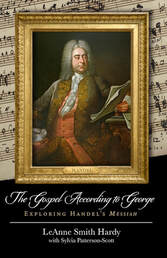 The idea for The Gospel According to George came to me at a Messiah sing-along at Yale University several years ago. The beautiful hall was crowded with enthusiastic music lovers who brought their own scores or bought one at the door. The soloists were exquisite, the music powerful. The Chinese graduate student sitting next to me had never heard the oratorio before; she only knew that it was famous. She didn’t sing, but as a Christian, she came along to find out what all the excitement was about. At the intermission she turned to me. “Do all these people believe what they are singing?” she asked in an awed voice. Sadly, I had to confess that most loved the music but had no idea what it was about. After that I couldn’t shake the idea of a book to take Messiah-lovers beyond the music to grasp the depth and breadth of the story Handel told. 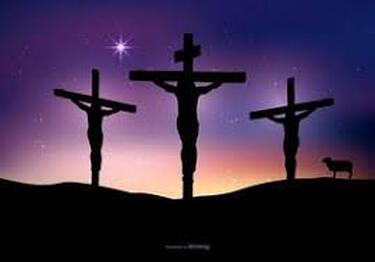 It wasn’t like I had never seen a crucifixion before. Of course I had. Even as a child in Gaul, I had witnessed executions. My grandfather died resisting the legions. My grandmother still hates them. My mother does not. At least, she married my father, a legionary from northern Italy who took his parcel of land along the banks of the Somme when he retired and married her. No, I, Decimus Longinus, Centurion of the Tenth Legion, had seen many crucifixions over the years. This wasn’t even the first I had carried out. It was part of the job when you were a Roman centurion—a part I would like to forget. For some reason, the locals never seem to take kindly to Roman rule, no matter the improvements Rome brings in roads, baths, aqueducts, and free trade. The little procession approached the city gate jammed with pilgrims come for the local Passover feast—something about their invisible god “passing over” houses with blood on the doorposts. Blood. Gruesome thing to celebrate. As far as I could tell, it was some kind of commemoration of their independence from…Egypt maybe? A thousand years ago. As long they focused on the distant past, it made no difference to me. “Move along!” I shouted in a vain attempt to clear the way. 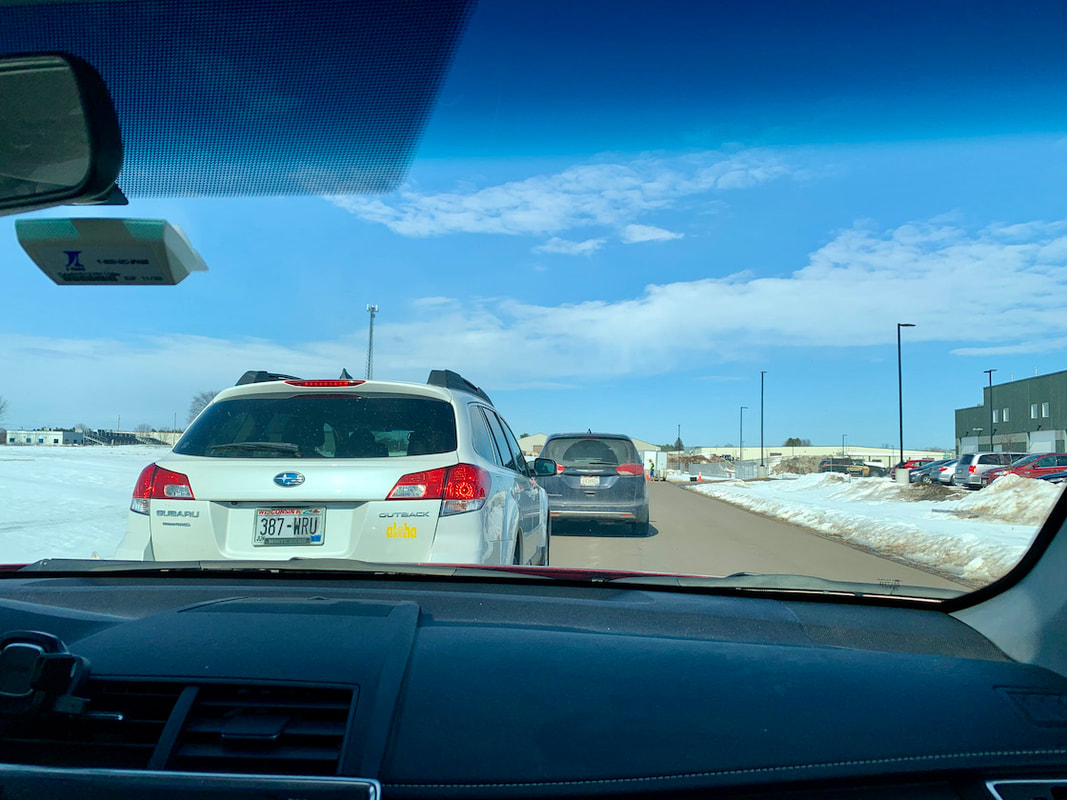 “I’m excited,” I said, surprised to feel the flutter of my heart. “Me too,” my husband admitted with a grin. Our car inched forward in the line, not nearly as slowly as the drive-thru Christmas light display in Duluth last December. But then, this time we had an appointment—an appointment we had waited months for—our first dose of the Moderna anti-Covid-19 vaccine. Yesterday I took a long walk in the woods, stopping to pray attributes of God at various benches, stumps and logs along the way like the one at the site of this photo. This entry on "God, our Generous Provider," from Honey from the Comb seemed especially appropriate for this week after Thanksgiving. After all our gratitude should be greater than what one day a year can contain. With no one to see me there by the lake, I threw back my head and opened my mouth like a baby bird as I prayed, ready to receive from God all the blessings he has for me.
GENEROUS PROVIDER As great as God is, he reaches out to us generously and meets our needs beyond our imagining. As you meditate on these verses, thank him for his generosity to you and open your mouth like an infant to be filled. I am the LORD your God, who brought you up out of Egypt. Open wide your mouth and I will fill it. Psalm 81:10 Wealth and honor come from you; you are the ruler of all things. In your hands are strength and power to exalt and give strength to all. 1 Chronicles 29:12 How abundant are the good things that you have stored up for those who fear you, that you bestow in the sight of all, on those who take refuge in you. Psalm 31:19 The lions may grow weak and hungry, but those who seek the LORD lack no good thing. Psalm 34:10 For the LORD God is a sun and shield; the LORD bestows favor and honor; no good thing does he withhold from those whose walk is blameless. Psalm 84:11 Thanks be to God for his indescribable gift! 2 Corinthians 9:15 He who did not spare his own Son, but gave him up for us all—how will he not also, along with him, graciously give us all things? Romans 8:32 But seek first his kingdom and his righteousness, and all these things will be given to you as well. Matthew 6: 33 And my God will meet all your needs according to the riches of his glory in Christ Jesus. Philippians 4:19 If you remain in me and my words remain in you, ask whatever you wish, and it will be done for you. John 15:7 Ask and it will be given to you; seek and you will find; knock and the door will be opened to you. For everyone who asks receives; he who seeks finds; and to him who knocks, the door will be opened. Which of you, if your son asks for bread, will give him a stone? Or if he asks for a fish, will give him a snake? If you, then, though you are evil, know how to give good gifts to your children, how much more will your Father in heaven give good gifts to those who ask him! Matthew 7:7-11 What no eye has seen, what no ear has heard, and what no human mind has conceived-- the things God has prepared for those who love him-- these are the things God has revealed to us by his Spirit. 1 Corinthians 2:9 -10a For you know the grace of our Lord Jesus Christ, that though he was rich, yet for your sakes he became poor, so that you through his poverty might become rich. 2 Corinthians 8:9 Now to him who is able to do immeasurably more than all we ask or imagine, according to his power that is at work within us, to him be glory in the church and in Christ Jesus throughout all generations, for ever and ever! Amen. Ephesians 3:20-21  Among the many things changed by Covid has been my involvement in a choral group that included many music teachers from surrounding communities. We rehearsed weekly in one of the high schools. Last spring as we prepared for our concert the school closed the building to outside personnel like us. Within a week school closed period. In the beginning we had hopes of rescheduling our concert for maybe June. Then September or October. My music still hangs in a bag on a hook ready to grab as I go out the door to rehearsal. This song is not from last spring’s planned program. It is from an earlier concert, but the text by American abolitionist, James Russel Lowell (1819-1891), has stuck with me. In recent days its meaning seems all the more powerful. 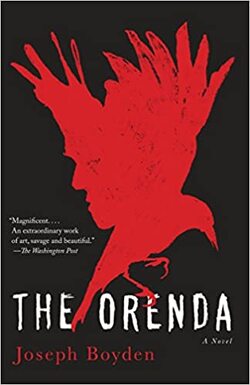 I have been reading a lot about Native Americans this past year in an effort to better understand my Ojibwe neighbors. I read The Orenda by Joseph Boyden in early March, but then Covid made it seem irrelevant. Recent protests for social justice brought my thoughts back to understanding neighbors whose cultures are different from mine, whose life experiences and worldviews are different. We aren’t all alike. We are different, and that difference enriches our world. Difference does not mean one is any less an image bearer of God than any other. We all deserve respect as God’s creation. We all stand in need of the gospel of Jesus Christ—a brown man from a lower class family in a backwater of an oppressive empire. With the publication of my new book Honey from the Comb, we have been talking about prayer on this blog. I have been using what is now published as Honey as the basis of my devotions for many years, but it doesn’t cover all the specific and immediate things that need prayer in my life—loved ones without Jesus, friends with cancer or with a job interview this week. When Honey was in a loose-leaf notebook, it was easy to keep extra pages in the back for my lists. More recently, that turned into a list on my phone. A few months ago, Marcia Strauss, prayer coordinator for our mission (SIM) introduced me to PrayerMate, a free app for organizing my prayer list.
 Many times these days I have found my stomach tied in knots. Parties with no social distancing prolong our corona agony. Anger against social injustice spills over into more injustices. Pickup trucks plow through protesters to make their own protest. What will happen when local schools reopen? How can we agree on measurable goals to put an end to violence in the street and racism in our communities? I pray, “Lord have mercy,” even as I acknowledge that we don’t deserve mercy anymore than Jerusalem did as the Babylonians approached. |
AuthorLeAnne Hardy has lived in six countries on four continents. Her books come out of her cross-cultural experiences and her passion to use story to convey spiritual truths in a form that will permeate lives. Add http://www.leannehardy.net/1/feed to your RSS feed.
To receive an e-mail when I post a new blog, please subscribe.
Categories
All
Archives
November 2022
|


 RSS Feed
RSS Feed